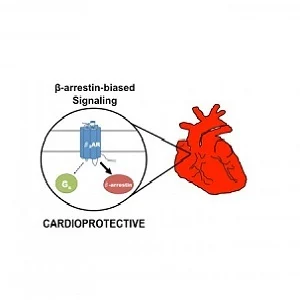Beta blockers are commonly used to treat heart disease. They block beta-adrenergic receptors in the heart and save heart cells from cell death. However, the biggest problem with beta blockers is that they also block the beta-adrenergic receptor's ability to keep the heart pumping.
Now, Jefferson researchers have discovered a way around this problem and have tapped an alternate pathway that can both block damage to the heart as well as enable it to keep pumping. The research is published in the Proceedings of the National Academy of Sciences USA (PNAS).
The new research could potentially result in the development of a new and more effective class of heart-failure medications. This could go a long way in changing how heart failure is currently treated.
Senior author Jeffrey Benovic, Ph.D., Thomas Eakins Professor and Chair of the Department of Biochemistry and Molecular Biology at the Sidney Kimmel Medical College and Associate Director at the Sidney Kimmel Cancer Center at Thomas Jefferson University were involved in this research. Dr. Benovic's lab developed a
series of molecules called pepducins that were derived from pieces of the beta2-adrenergic receptor, and which, they discovered, could selectively activate the very receptor they came from. Dr. Benovic noticed that the molecule shared similar characteristics to the heart failure medication carvedilol. They then consulted with Dr. Douglas Tilley, PhD, at Temple University who tested how heart cells responded to the molecule. Dr. Tilley found that when the heart cells were pulsed with pepducin, the cells started to beat more forcefully which is something they did not expect would happen.
Further analysis showed that the pepducin activated the beta2 adrenergic recpetor but had no impact on beta1 receptor.
The next steps, said Dr. Benovic, are to design a better version of the pepducin. In addition, Dr. Benovic and colleagues plan to screen existing small molecules, or drugs, to see if one can mimic the action of the pepducin. They also plan to study the structure of the pepducin and the beta2 receptors to gain better insight into the design of more effective pepducin-like molecules.
“If we find or design a compound that works like this pepducin, it wouldn’t necessarily cure heart disease, but it would give doctors another tool to help bolster a failing heart,” says Benovic.
Source: Proceedings of the National Academy of Sciences USA (PNAS)
Image Credit: Lab of Jeffrey Benovic, Thomas Jefferson University










